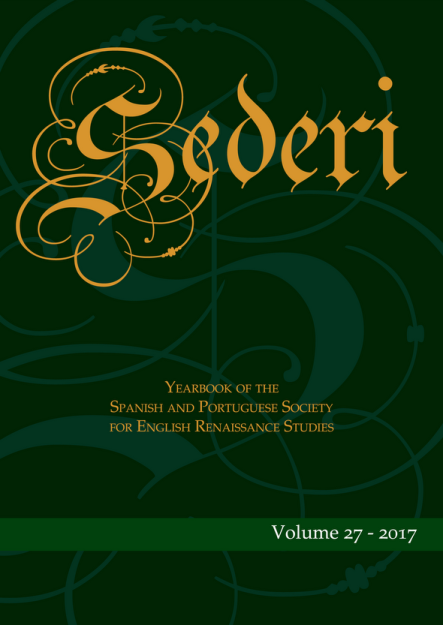
Sederi 27
Sederi 27 — 2017
EDITOR
Ana Sáez-Hidalgo
MANAGING EDITOR
Francisco J. Borge López
REVIEW EDITOR
María José Mora
ISSN 1135-7789
Sofía Muñoz-Valdivieso, “Shakespeare our contemporary in 2016: Margaret Atwood’s rewriting of The Tempest in Hag-Seed” SEDERI 27 (2017): 105–129.
DOI: https://doi.org/10.34136/sederi.2017.5 Download PDF
Abstract
Margaret Atwood’s novel Hag-Seed (2016) is a retelling of The Tempest that transfers the actions from the magic island of the original play to present-day Canada: the avant-garde artistic director of a Shakespearean Festival is ousted from his job by his more world-savvy deputy, lives in isolation for twelve years and plots his revenge, which will involve a staging of The Tempest at the local prison where he has been teaching for some time as Mr Duke. Hag-Seed is part of a larger project of fictional retellings of the Bard’s plays conceived by Hogarth Press for the commemoration of the 400th anniversary of his death, a moment when Shakespeare’s cultural capital seems to be circulating more energetically than ever. The present article analyses Hag-Seed as a neo-Shakespearean novel that is original in the double sense of the term that Atwood’s teacher Northrop Frye so frequently remarked: imaginative, innovative, and inventive but also true to its fountain and origins.
Keywords: Shakespeare; The Tempest; Margaret Atwood; Hag-Seed; neo-Shakespearean novel; cultural capital.
References
Atwood, Margaret. 1988. Cat’s Eye. Toronto: McClelland and Stewart.
Atwood, Margaret. 1992. Good Bones. Toronto: Coach House Press.
Atwood, Margaret. 2002. Negotiating with the Dead: A Writer on Writing. Cambridge: Cambridge University Press.
Atwood, Margaret. 2005. The Penelopiad. Edinburgh: Canongate Books.
Atwood, Margaret. 2007. The Tent. New York: Knopf Doubleday.
Atwood, Margaret. 2014. Stone Mattress. Toronto: McClelland and Stewart.
Atwood, Margaret. 2016a. Hag-Seed: The Tempest Retold. London: Hogarth.
Atwood, Margaret. 2016b. “A Perfect Storm: Margaret Atwood on Rewriting The Tempest.” The Guardian, September 24, 2016. https://www.theguardian.com/books/2016/sep/24/margaret-atwood-rewriting-shakespeare-tempest-hagseed.
Barker, Francis, and Peter Hulme. 1985. “Nymphs and Reapers Heavily Vanish: The Discursive Con-Texts of The Tempest.” In Alternative Shakespeares, edited by John Drakakis, 191–205. London and New York: Methuen.
Bate, Jonathan. 1993. Shakespeare and Ovid. Oxford: Oxford University Press.
Bate, Jonathan. 2016. “Hag-Seed: The Tempest Retold by Margaret Atwood.” The Times, October 1, 2016. http://www.thetimes.co.uk/article/hag-seed-the-tempest-retold-by-margaret-atwood-2bpnrmx2k.
Bate, Laura. 2013. Shakespeare Saved My Life: Ten Years in Solitary with the Bard. Naperville, IL: Sourcebooks.
Brown, Paul. 1985. “‘This thing of darkness I acknowledge mine’: The Tempest and the Discourse of Colonialism.” In Political Shakespeare: New Essays on Cultural Materialism, edited by Jonathan Dollimore and Allan Sinfield, 48–71. Manchester: Manchester University Press.
Cartelli, Thomas. 1999. Repositioning Shakespeare: National Formations, Postcolonial Appropriations. London and New York: Routledge.
Césaire, Aimé. 1969. Une Tempête. Paris: Éditions du Seuil.
Cliff, Michelle. 1987. No Telephone to Heaven. New York: Plume.
“Cover and title revealed for Hag-Seed.” Penguin Random House Canada, February 22, 2016. http://penguinrandomhouse.ca/news/cover-and-title-revealed-hag-seed-new-novel-margaret-atwood-hogarth-shakespeare-series.
Daniell, David. 1989. The Tempest. London: Palgrave Macmillan.
Desmet, Christy, and Sujata Iyengar. 2015. “Adaptation, Appropriation or What You Will.” Shakespeare 11 (1): 10–19.
Dickson, Andrew. 2015. Worlds Elsewhere: Journeys around Shakespeare’s Globe. London: Bodley Head.
Frye, Northrop. 1965. A Natural Perspective: The Development of Shakespearean Comedy and Romance. New York and London: Columbia University Press.
Frye, Northrop. 1986. Northrop Frye on Shakespeare. New Haven: Yale University Press.
Greenblatt, Stephen. 1990. Learning to Curse: Essays in Early Modern Culture. New York and London: Routledge.
Gurr, Andrew. 2014. “New Directions: Sources and Creativity in The Tempest.” In The Tempest: A Critical Reader, edited by Alden T. Vaughan and Virginia Mason Vaughan, 93–113. London: Bloomsbury.
Hamilton, Donna B. 1990. Virgil and The Tempest: The Politics of Imitation. Columbus: Ohio State University Press.
Hedrick, Donald, and Bryan Reynolds, eds. 2000. Shakespeare without Class: Misappropriation of Cultural Capital. New York: Palgrave.
“Hogarth Shakespeare.” Last accessed August 2017. http://crown-publishing. com/hogarth-shakespeare/
Huang, Alexa, and Elizabeth Rivlin, eds. 2014. Shakespeare and the Ethics of Appropriation. New York: Palgrave.
Hulme, Peter, and William H. Sherman, eds. 2000. The Tempest and Its Travels. London: Reaktion Books.
Hutcheon, Linda. 2006. A Theory of Adaptation. London and New York: Routledge.
Ingalls, Rachel. 1982. Mrs Caliban. Boston: Harvard Common Press.
Kraft, Barry. 2014. The Shakespeare Insult Generator. San Francisco: Chronicle Books.
Lamming, George. 1972. Water with Berries. New York: Holt, Rinehart and Winston.
Laurence, Margaret. 1976. The Diviners. Toronto: McClelland & Stewart.
Lehmann, Courtney. 2014. “Double Jeopardy: Shakespeare and Prison Theater.” In Shakespeare and the Ethics of Appropriation, edited by Alexa Huang and Elizabeth Rivlin, 89–105. New York: Palgrave.
Lindley, David. 1984. The Court Masque. Manchester: Manchester University Press.
“Margaret Atwood: Shakespeare in my Work.” Stratford Festival Forum, 2015. https://www.youtube.com/watch?v=md-4oLobu04.
Naylor, Gloria. 1988. Mama Day. New York: Vintage.
“The Next Chapter: Audio Interview with Margaret Atwood.” CBC Listen, October 10, 2016. http://podcast.cbc.ca/mp3/podcasts/nextchapter_20161010_25846.mp3
Novy, Marianne, ed. 1999. Transforming Shakespeare: Contemporary Women’s Re-Visions in Literature and Performance. New York: St Martin’s Press.
Orgel, Stephen. 1987. “Introduction.” In The Tempest, edited by Stephen Orgel, 1–88. Oxford: Oxford University Press.
Said, Edward W. 1993. Culture and Imperialism. London: Vintage.
Sanders, Julie. 2001. Novel Shakespeare: Twentieth-Century Women Novelists and Appropriation. Manchester: Manchester University Press.
Sanders, Julie. 2006. Adaptation and Appropriation. London: Routledge.
Scott-Douglass, Amy. 2007. Shakespeare Inside: The Bard Behind Bars. London: Continuum.
Shakespeare, William. 1987. The Tempest. Edited by Stephen Orgel. Oxford: Oxford University Press.
Thompson, Ann. 1998. “Miranda Where’s Your Sister?” In Critical Essays on Shakespeare’s The Tempest, edited by Virginia Mason Vaughan and Alden T. Vaughan, 234–44. New York: G.K. Hall.
Vaughan, Virginia Mason. 2014. “The Critical Backstory: ‘What’s Past is Prologue’.” In The Tempest: A Critical Reader, edited by Alden T. Vaughan and Virginia Mason Vaughan, 13–38. London: Bloomsbury.
Warner, Marina. 1992. Indigo; or, Mapping the Waters. London: Chatto & Windus.
Winterson, Jeanette. 2015. The Gap of Time. London: Hogarth.
Zabus, Chantal. 2002. Tempests after Shakespeare. New York: Palgrave.
